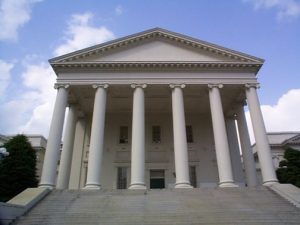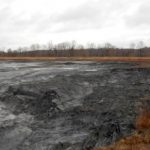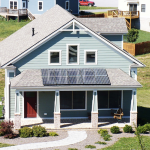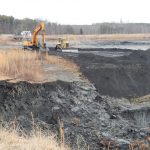 Virginia’s legislative session may be brief, but many bills with major implications for our future energy mix have already been acted on. Two weeks into this year’s session, here is a look at where our top issues stand.
Virginia’s legislative session may be brief, but many bills with major implications for our future energy mix have already been acted on. Two weeks into this year’s session, here is a look at where our top issues stand.
Blog Archives
Update from the Virginia General Assembly
Our Energy Savings campaign is heating up in the High Country

Back in October we launched the High Country Home Energy Makeover Contest as part of our campaign to motivate Blue Ridge Electric Membership Corp. to offer an on-bill financing program for their members in western North Carolina. We solicited enough support to pay for energy efficiency retrofits for three Blue Ridge Electric members. Read on to meet the contest winners.
EPA finalizes long-awaited coal ash regulations

The day we’ve been waiting for has finally come. No, not Friday — the U.S. Environmental Protection Agency to release its long-awaited coal ash rule. But, as expected, the EPA’s new rule does not go far enough to truly fix the major pollution problems associated with coal ash including contamination of waterways and drinking water supplies.
A schizoid rate case and a climate directive in Virginia
 A recent order from the Virginia State Corporation Commission could spell trouble for residential and small-scale solar in the state. But there is also reason to have hope as regulators rejected a proposal by Appalachian Power Company to nearly double the fixed fees that show up on its customers’ monthly bills. Here’s a look at a schizoid rate case and what it could mean for Virginia’s energy future.
A recent order from the Virginia State Corporation Commission could spell trouble for residential and small-scale solar in the state. But there is also reason to have hope as regulators rejected a proposal by Appalachian Power Company to nearly double the fixed fees that show up on its customers’ monthly bills. Here’s a look at a schizoid rate case and what it could mean for Virginia’s energy future.
Coal ash cleanup still contested in North Carolina
 As the U.S. Environmental Protection Agency puts the final touches on the first-ever federal regulation of coal ash, North Carolina’s response to the Dan River spill is still hotly contested and new controversies about the best ways to clean up coal ash are beginning to emerge.
As the U.S. Environmental Protection Agency puts the final touches on the first-ever federal regulation of coal ash, North Carolina’s response to the Dan River spill is still hotly contested and new controversies about the best ways to clean up coal ash are beginning to emerge.
Virginia utilities expand their menus with new energy-saving offerings
 Advocates for energy efficiency often call it “the first fuel,” and Virginia is now creeping ahead toward gains in this lowest-cost power source. The state’s largest utilities are promoting new programs to help their customers invest in energy-saving home improvements, which can help Virginians save money while reducing energy consumption and pollution.
Advocates for energy efficiency often call it “the first fuel,” and Virginia is now creeping ahead toward gains in this lowest-cost power source. The state’s largest utilities are promoting new programs to help their customers invest in energy-saving home improvements, which can help Virginians save money while reducing energy consumption and pollution.
Coal ash rule reaches White House for final review

The U.S. Environmental Protection Agency has sent the long-awaited Coal Ash Rule to the White House for final review. But until the agency’s Dec. 19 deadline, we likely won’t know much about how far the final rule will go to protect communities from coal ash pollution. And that’s probably just how the White House wants it.
Appalachian Power’s solar customers rise and shine for clean energy
 No one is more vocal about the need for Appalachian Power Company to invest in solar than those who already have: customers with their own solar arrays. But Virginians who produce their own energy are just part of a larger group of APCo customers demanding their utility expand its energy efficiency programs, encourage residential solar and take advantage of other opportunities to increase clean energy.
No one is more vocal about the need for Appalachian Power Company to invest in solar than those who already have: customers with their own solar arrays. But Virginians who produce their own energy are just part of a larger group of APCo customers demanding their utility expand its energy efficiency programs, encourage residential solar and take advantage of other opportunities to increase clean energy.
Corporate windfall lets N.C. utilities charge customers under outdated tax rate
 The North Carolina Utilities Commission (somehow) decided that even though the legislature cut North Carolina’s corporate income tax rate from 6.9 percent to 5 percent last year, Duke Energy and other public utilities can continue charging customers at 6.9 percent and pocket the difference. Meanwhile, for three consecutive quarters, Duke has received a larger rate of return than authorized by state regulators, or in this case, the utilities commission.
The North Carolina Utilities Commission (somehow) decided that even though the legislature cut North Carolina’s corporate income tax rate from 6.9 percent to 5 percent last year, Duke Energy and other public utilities can continue charging customers at 6.9 percent and pocket the difference. Meanwhile, for three consecutive quarters, Duke has received a larger rate of return than authorized by state regulators, or in this case, the utilities commission.
A huge win: Gainesville enacts policy to stop using mountaintop removal coal
 Because of the heroic efforts of a group of citizens, Gainesville, Fla., became the first city in America to enact a policy to reduce its reliance on mountaintop removal coal. This victory was the culmination of three and a half years of work that included five hearings by the city commission, hundreds of hours of volunteer work and dozens of meetings with city commissioners.
Because of the heroic efforts of a group of citizens, Gainesville, Fla., became the first city in America to enact a policy to reduce its reliance on mountaintop removal coal. This victory was the culmination of three and a half years of work that included five hearings by the city commission, hundreds of hours of volunteer work and dozens of meetings with city commissioners.

